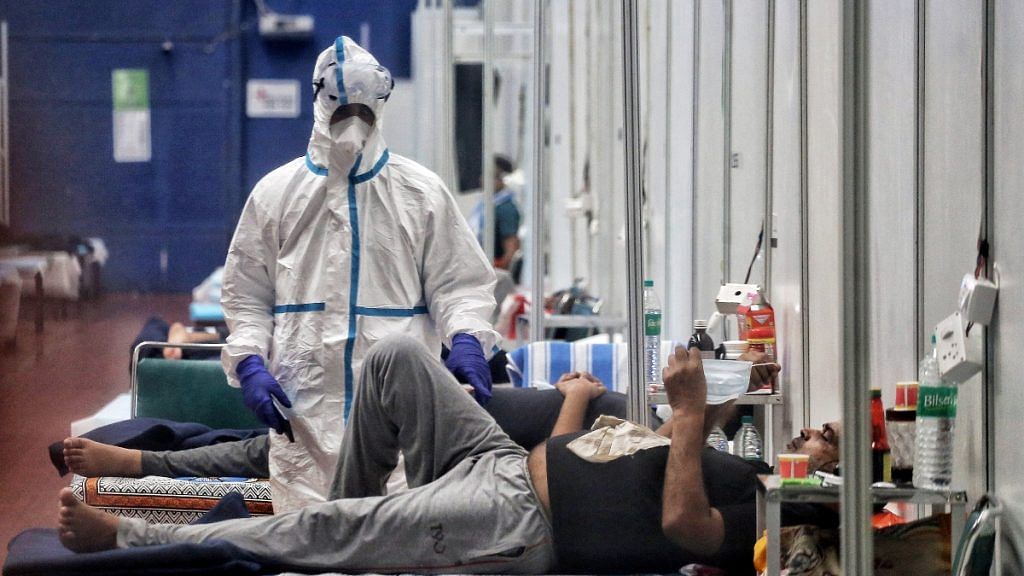New Delhi: Prime Minister Narendra Modi called for testing and surveillance to be stepped up, with an emphasis on effective messaging to tackle rumours surrounding Covid-19, as he met the chief ministers of six states and Delhi Wednesday.
The seven participating chief ministers represented the states/UTs worst affected by Covid-19 — Uttar Pradesh, Maharashtra, Karnataka, Punjab, Andhra Pradesh and Tamil Nadu, besides Delhi.
The meeting came a day after the central government said it is expecting an “escalation” in the coronavirus situation on account of the upcoming festival season as also the winter, when respiratory issues are know to occur more.
During their discussions, Modi asked states to reassess how effective one-two day lockdowns are in preventing the spread of Covid-19, especially as efforts are made to restart economic activities. He also told participants to ensure seamless inter- and intra-state transport of life-saving goods like oxygen.
“It is true that Covid infections in India are rising but we are also testing more than 10 lakh per day. Many people are recovering too…” he said.
“We have taken an important decision to use state disaster relief funds for building corona infrastructure. We have decided that the ceiling for its utilisation for Covid-19 will be raised to 50 per cent from 36 per cent currently. States need to decide how effective one-two day lockdowns are in preventing Covid,” he added. “It should not be that that is what is causing roadblock in economic activities. States need to think about this.”
He also talked about the fact that the Ayushman Bharat Pradhan Mantri Jan Arogya Yojana, his government’s flagship healthcare scheme, has just completed two years. Under the scheme, the poorest of Indians get an annual health cover of Rs 5 lakh.
More than 63 per cent of India’s active coronavirus cases are concentrated in the six states and one UT mentioned above. They also account for 62 per cent of the total confirmed cases and 77 per cent of all deaths. All of them have reported an increase in the number of cases in recent days.
Maharashtra, Punjab and Delhi are reporting high mortalities with a case fatality rate (CFR) of more than 2 per cent. Other than Punjab and Uttar Pradesh, all have a positivity rate — the share of tests yielding a positive diagnosis — above the national average of 8.52 per cent.
Also Read: India’s Covid response is ‘flying blind’ without accurate deaths data, experts claim
‘Need for effective messaging’
The discussions at the meeting saw Modi highlight the need for effective testing, contact-tracing and surveillance, along with messaging. He urged the chief ministers to hold block-level meetings over a seven-day period to sensitise the system on the needs of Covid management.
“Effective messaging is also important because most infections are asymptomatic. Rumours are flying thick and fast and people are beginning to doubt the veracity of testing. Some people are even underestimating the infection,” he said. “All studies say mask is very effective in preventing Covid, so it is very important to make it a habit. Unless we do so, it will not be effective,” he added.
While Maharashtra CM Uddhav Thackeray agreed that masks need to become a habit “like eyeglasses”, his Punjab counterpart Amarinder Singh said there is still an element of casualness among people in his state.
“They say, take Rs 500 if you have to, and let us be,” a source present in the meeting quoted Singh as saying. This is the second time that Singh has flagged this issue at a meeting with the PM. At the earlier meeting, held last month, he had spoken about a sense of “everything’s fine” among Punjab residents.
Punjab is not yet among the top five high-burden states, but with 2,000-odd new cases being reported every day, the state may well be on its way to the list. It is already among the top 10 high-mortality states, and has the highest case fatality rate in the country, which means a higher share of its Covid patients are dying than anywhere else in India.
Rumours are said to have proved a major hurdle for the state government in widening its testing net. “There are very strong rumours that people are being asked to get admitted because the Centre is paying the state per hospitalisation. That is making things very difficult,” said a senior central government official.
‘Emulate Tamil Nadu’
The central government cited Tamil Nadu as a model to follow vis-a-vis testing since almost all tests in the state are being conducted through RT-PCR — considered the gold-standard of testing — instead of quicker alternatives.
However, the southern state, which was also lauded for effective contact-tracing, was urged to work on bringing down its CFR, which is currently higher than the national average even though it was lower for most of the pandemic’s duration so far.
The central government also repeated its advisory that symptomatic subjects who test negative with rapid antigen testing be made to take the RT-PCR test for a confirmed diagnosis.
PM Modi also spoke about the need to ensure hassle-free inter- and intra-state movement of essential goods, especially oxygen, to ensure that life-saving services are not hampered and blackmarketing does not get an inadvertent leg-up. Among other things, he summed up the need to promote Covid-appropriate festivities in the coming days.
Also Read: 80% Covid patients in India are asymptomatic, health ministry analysis finds
